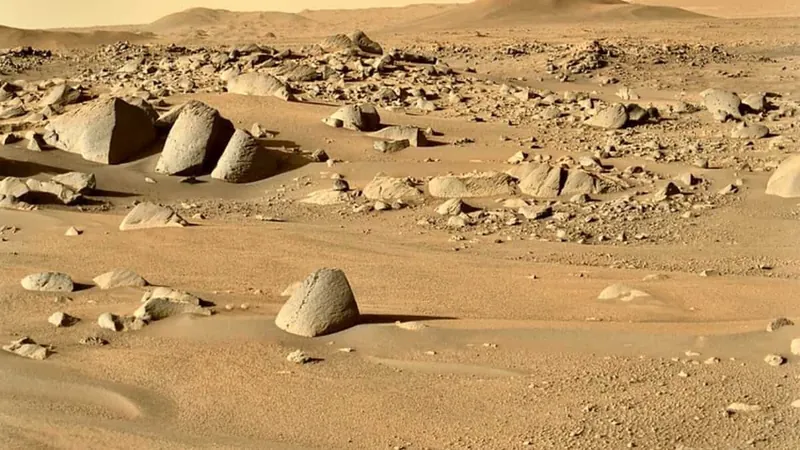
Turning Martian CO2 into Fuel and Plastic: Scientists Unveiling a Game-Changer for Mars Colonization!
2024-11-13
Author: Sarah
Introduction
Scientists at the University of British Columbia (UBC) recently unveiled groundbreaking research that could revolutionize how we think about energy and resources on Mars. Their study focuses on harnessing thermoelectric generators to not only generate electricity but also convert the abundant carbon dioxide in the Martian atmosphere into valuable fuels and chemicals — a process that could be pivotal for future human colonization of the red planet.
The Research Findings
The study, which has been published in the respected journal Device, showcases the potential of leveraging modest temperature differentials to enable CO2 conversion. Specifically, the researchers found that a temperature difference of at least 40 degrees Celsius would be sufficient to produce a steady current that could power an electrolyzer, converting CO2 into carbon monoxide (CO). This innovative approach opens the door to producing essential resources directly from Mars' atmosphere, where a staggering 95% of the air is CO2.
Expert Insights
Dr. Abhishek Soni, a postdoctoral research fellow at UBC and the study's lead author, highlighted the long-term relevance of their findings: "The environmental conditions on Mars captured my interest. By exploiting the drastic temperature differences—ranging from 20 degrees Celsius to frigid lows of -153 degrees Celsius—we could generate power with thermoelectric generators while also transforming that CO2 into vital products that could sustain a Mars colony."
Future Implications for Mars Colonization
Imagining a future where humans reside on Mars necessitates innovative thinking and solutions, and this research paves the way for creating a biodome environment conducive to life. To maintain a stable habitat, engineers would need to construct biodomes that can sustain room temperature while integrating thermoelectric generators on their surfaces. These generators would harness the heat difference between the warm interior of the dome and the icy Martian exterior to generate the necessary power for CO2 conversion.
Broader Applications
Professor Curtis P. Berlinguette, the principal investigator on the project, remarked on the broader applications of this technology: "We’re really excited about the potential of making not only carbon-neutral fuels but also plastics that could support a Martian economy. This isn’t just theoretical; it’s a step towards creating a self-sufficient human presence on Mars."
Conclusion
As scientists continue to explore the logistics of colonizing Mars, this research offers a tantalizing glimpse into a future where humanity not only survives but thrives on another planet. The implications are profound: harnessing Martian resources could lead to sustainable living, allowing future colonists to produce essential materials in situ rather than relying on Earth supplies.
The Future of Mars Colonization
So, could Mars become the new frontier for human ingenuity? With innovations like this, the dream of a thriving Martian colony may be closer than we think! Stay tuned as researchers continue to explore the possibilities of life and industry beyond our home planet.
 Brasil (PT)
Brasil (PT)
 Canada (EN)
Canada (EN)
 Chile (ES)
Chile (ES)
 España (ES)
España (ES)
 France (FR)
France (FR)
 Hong Kong (EN)
Hong Kong (EN)
 Italia (IT)
Italia (IT)
 日本 (JA)
日本 (JA)
 Magyarország (HU)
Magyarország (HU)
 Norge (NO)
Norge (NO)
 Polska (PL)
Polska (PL)
 Schweiz (DE)
Schweiz (DE)
 Singapore (EN)
Singapore (EN)
 Sverige (SV)
Sverige (SV)
 Suomi (FI)
Suomi (FI)
 Türkiye (TR)
Türkiye (TR)